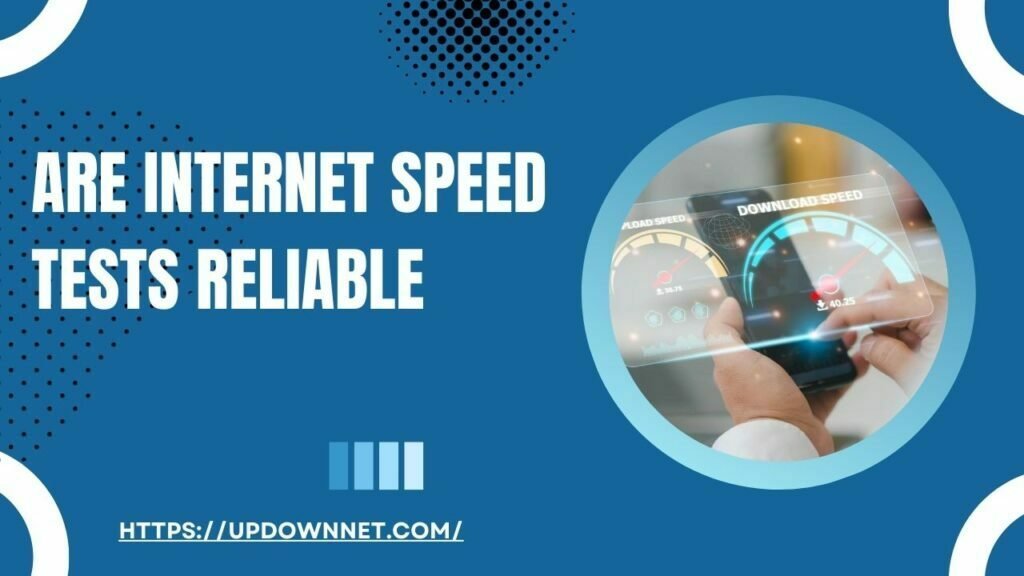Learn Are Internet Speed Tests Reliable. Find out why speed tests can give inconsistent results and how to ensure you get accurate measurements of your internet connection’s performance.
Introduction:
The need for a fast and reliable internet connection has become imperative in today’s digitally driven society. The speed of our internet can significantly affect our online experiences, whether it’s for work, entertainment, or communication. A wide variety of internet speed tests have become popular as a means of evaluating the quality of this essential lifeline.

Are Internet Speed Tests Reliable?
The short answer is yes, Speed tests are valuable tools for assessing your internet connection. They do this by uploading and downloading data packets to and from a server and then calculating the time it takes for these transfers.
A speed test can provide a reasonably accurate representation of the performance of your connection at a given time. A good use of these tools is to identify issues such as a slow Internet connection or a problem with the network. Running multiple tests at different times can help determine the root cause of sluggish speeds or interruptions every time you encounter them.
- Use Reliable Test Sites: You should use well-respected and well-known speed testing websites or apps. There are usually multiple test servers available and they can provide a more accurate assessment.
- Test at Different Times: Testing your internet’s performance at different times of the day will provide a better picture of how the system is performing.
- Wired Connection: The device should be connected directly to the modem via an Ethernet cable if possible. This eliminates the possibility of Wi-Fi-related problems.
- Rule Out Background Downloads: The test should not be interrupted by the download of large files or streams of content on other devices on your network.
- Contact Your ISP: The issue should be investigated by your Internet service provider if you consistently receive speeds significantly lower than what you are paying for.
Factors Affecting Internet Speed Test Results
Here are the following factors:
1. Server Location
A speed test is conducted by routing your connection to a server hosted by the testing service. The location of this server in relation to your location may influence the results. There is a good chance that your internet connection will perform better if you are connected to a nearby server, while a distant server may perform less well, even if the connection is strong.
2. Network Congestion
The amount of traffic on the Internet varies throughout the day. There may be network congestion during peak hours when many people are online. There may be congestion during the test, which may result in slower speeds, which may not be indicative of the actual performance of your internet connection.
3. Your Device
You should also consider the device you are using for the speed test. The maximum speeds that your internet connection can provide may not be achievable by older devices or those with limited processing power.
4. Interference
The interference caused by other electronic devices, such as microwave ovens or cordless phones, can disrupt the Wi-Fi signal and disrupt the test results.
5. Service Plan
There is a maximum speed that is specified in your internet service plan. Speed tests should ideally correspond with your plan’s advertised speeds. In reality, this isn’t always the case, particularly if your provider’s infrastructure is not up to par.
6. Type of Test
A variety of internet speed test services are available, and not all of them are equally reliable. Some may provide more accurate results than others due to their testing methodology and server locations.

Enhancing the Reliable of Internet Speed Tests
To get the most reliable results from an internet speed test, consider the following tips:
- Use Multiple Test Services: Run tests from multiple reputable speed test websites to get a better understanding of your internet’s performance. A more accurate picture can be obtained by averaging the results.
- Test at Different Times: Test the network at different times of the day and on different days in order to account for variations in network congestion.
- Connect via Ethernet: A direct connection via Ethernet cable should be made between your device and your modem if possible. You will therefore be able to assess your connection speed more accurately due to the removal of potential Wi-Fi interference.
- Check with Your Internet Service Provider: You should contact your internet service provider if your test results consistently fall below the advertised speeds under your plan.
Are internet speed tests accurate indicators of my internet performance?
A connection’s speed can only be accurately measured at the point where it enters your home. Your laptop will have a bandwidth cap of 30 Mbps because you are connecting it to the internet via 2.4 GHz wireless.
The speed of your connection will improve significantly if you upgrade to a 5 GHz connection.
Is there a difference between various internet speed test services?
It is true that different speed testing services may employ different testing methodologies and server locations, which may affect the results. A comprehensive assessment requires the use of multiple testing services.
Do speed tests measure both download and upload speeds?
Yes, most internet speed tests measure both download (data received from the internet) and upload (data sent to the internet) speeds, providing a comprehensive assessment of the performance of your connection.
Can using a VPN affect the accuracy of my speed test results?
It is true that the use of a Virtual Private Network (VPN) may have an adverse effect on the accuracy of speed test results. Your traffic is routed through a VPN server when you connect to it, which may be located in a different country than you.
The location of the server may influence the measured speed, thus resulting in varying results.
Conclusion:
internet speed tests can be a useful tool for measuring the speed and performance of your internet connection. While they may not always provide perfect accuracy due to various factors, they can still give you a general idea of your internet speed.
It is important to consider the limitations of these tests and take other factors into account, such as network congestion and device capabilities. Ultimately, using multiple speed tests and comparing the results can help you get a more comprehensive understanding of your internet speed.




Pingback: How to Test Speed of Network Cable? A Comprehensive Guide - It's All About Internet